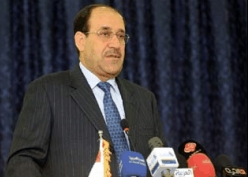
By Qassim Khidhir Hamad.
This article was originally published by Niqash. Any opinions expressed are those of the author, and do not necessarily reflect the views of Iraq Business News.
There has been an ongoing conflict between Iraqi Kurdistan and the rest of Iraq. But the representative of a major Shiite Muslim political party says that there won’t be a war – and speculates that the current PM’s days in power are numbered.
Bashir Adel Gli is the representative of the Islamic Supreme Council of Iraq, one of the most important political organizations representing the interests of Iraq’s Shiite Muslims, in the semi-autonomous state of Iraqi Kurdistan.
Gli discusses the relationship between the Shiite Muslims of Iraq, one of the two major sects in the country, and Iraq’s Kurdish ethnic minority.
The Kurdish control the semi-autonomous state of Iraqi Kurdistan and have their own military, legislative system and local government. And recently the authorities there have been coming into more conflict with those from Baghdad; in particular, a recent stoush in one of the disputed areas of the country has made headlines as both sides have sent more troops into the area.
The disputed areas are controversial in Iraq because the Iraqi Kurdish say they belong to Iraqi Kurdistan whereas the government of Iraq, which is dominated by Shiite Muslim parties, claims them for their own.
The most senior Shiite Muslim clerics have already appealed for calm and Gli talks about how it would be very difficult for the Shiite Muslim Prime Minster, Nouri al-Maliki, to go to war without their approval. The senior Shiite Muslim politician also discusses where he thinks the Iraqi government is going now and whether al-Maliki will be able to stay in power.
NIQASH: How do you feel about the current relationship between the Shiite Muslims of Iraq and Iraq’s Kurdistan people?
Bashir Adel Gli: The relationship between Iraq’s Shiite Muslims and the Kurdish people is a historic one. It goes back to the time that [religious leader] Grand Ayatollah Muhsin al-Hakim [the grandfather of Ammar al-Hakim, current leader of the Supreme Islamic Iraqi Council] issued a fatwa [religious edict] in 1965 that forbade Shiite Muslims to fight with the Kurdish.
This decree was copied and distributed all over Iraq and it had a big impact on Shiite Muslim soldiers.
He issued that decree after some Sunni Muslim clerics issued a totally different fatwa saying that their followers were allowed to kill the Kurdish. The [Sunni Muslim-dominated] authorities were trying to find some way of justifying their ethnic cleansing and killing of the Kurdish people. And what al-Hakim said at the time made them very angry.
As a result, 70 members of al-Hakim’s family were arrested and later killed.
Basically Shiite Muslim ideology says that Shiites must support the oppressed at all times; and that they must not support the dictator, no matter who that dictator is.
NIQASH: So how do you see the current problem between Erbil and Baghdad: is it a Shiite Muslim-Kurdish problem?
Bashir Adel Gli: No, it is the problem between the Dawa Party [headed by Nouri al-Maliki] and the government of Iraqi Kurdistan. It is not a problem between Shiites and Kurds in general.
NIQASH: So do you worry that there will be war between Iraq and Iraqi Kurdistan?
Bashir Adel Gli: The possibility of war is very remote. Anyway a war between Erbil and Baghdad would be far from easy – and for many reasons. For one thing, war would wreck any economic gains made in Iraq and for another thing, Shiite Muslim religious leaders wouldn’t allow it to happen.
Anyway, in today’s Iraq power does not rest in the hands of one man, who can then do as he likes. Al-Maliki can’t make decisions alone. And there are many important Shiite Muslim personalities who don’t want to see the Iraqi-Kurdish relationship destroyed.
And it is the same here in Iraqi Kurdistan. There are a lot of Iraqi Kurdish politicians who have said to me that they don’t want a war with Baghdad and that they’re opposed to the idea.
NIQASH: After all war would put politicians’ business interests at risk. And they won’t want that. Is that what you’re saying?
Basheer Adel Gli: Yes.
NIQASH: Despite all this though, it seems that both sides are sending more military into the disputed areas every day. People here in Iraqi Kurdistan are frightened, they think that war is inevitable.
Bashir Adel Gli: I have no fear. There won’t be a war.
NIQASH: And what makes you so sure of that?
Bashir Adel Gli: Because al-Maliki has a lot of opponents in Baghdad – such as the Islamic Virtue Party [the Fadhila party], the Islamic Supreme Council, the Sadrists [Editor’s note: the latter three are all Shiite-Muslim dominated] and the Iraqiya party. All of his opponents simply won’t let this happen. And the Kurdish won’t allow the Kurdish military [the peshmerga] to attack the Iraqi army either.
NIQASH: So what do you think will happen in Iraqi politics in 2013?
Bashir Adel Gli: I can’t really predict that. But I do think it will be the end of al-Maliki. I think if al-Maliki tries to run for the third term, he will find that those opposed to him will multiply.





